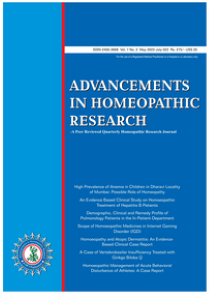An Observational Study to Assess the Probable Exciting Factors (Mental /Emotional) Triggering the Physical Manifestations of Psoriasis in 20-60 Years Aged Patients.
DOI:
https://doi.org/10.48165/ahr.2025.10.2.9Keywords:
Mental/Emotional triggers, Physical manifestations of Psoriasis, Psoriasis, Triggering factors for PsoriasisAbstract
Background-Skin is the mirror of internal health, any disturbance in here reflects on skin which is very worrying. Psoriasis is one of the non communicable chronic skin disease. Though non fatal bur its recurrence and complications make people suffer a lot. The real cause is yet to be discovered. A study conducted on global burden of disease in 2010 and 2014 showed that 4th leading cause of non-fatal morbidity were skin diseases worldwide. Objective-Present study is an attempt-to understand the mental/emotional factors which trigger/aggravate the psoriasis. Methodology-Purposive sampling method was used to select subjects based on inclusion/exclusion criterion. A detailed individual case taking was done to understand the triggering/aggravating factors at mental/emotional level. Results-In this study it was found that loss of loved ones (20%) and suppressed anger (20%) as a main triggering factors. The most common age group affected was 21-30years (40%), Conclusion-though with this we cannot conclude these are the sole triggering factors, there may be more as in homoeopathy advocates individualization as one of the basic fundamental principles, and it is recommended to study with large samples.
References
Douglass, M. E. (1900). Skin diseases: Their description, etiology, diagnosis and treatment [Internet]. Boericke & Tafel. Internet Archive. Available from: https://archive.org/details/skindiseasesthe00douggoog/page/n7/mode/2up
National Institute of Arthritis and Musculoskeletal and Skin Diseases (NIAMS). (2017). Psoriasis [Internet]. Available from: https://www.niams.nih.gov/health-topics/psoriasis
Raharja, A., Mahil, S. K., & Barker, J. N. (2021). Psoriasis: A brief overview. Clinical Medicine (London, England), 21(3), 170–173. Available from: https://pubmed.ncbi.nlm.nih.gov/34001566/
Seth, D., Cheldize, K., Brown, D., & Freeman, E. F. (2017). Global burden of skin disease: Inequities and innovations. Current Dermatology Reports, 6(3), 204–210. Available from: https://www.ncbi.nlm.nih.gov/pmc/articles/PMC5718374/
Yakupu, A., Aimaier, R., Yuan, B., Chen, B., Cheng, J. A., Zhao, Y., et al. (2023). The burden of skin and subcutaneous diseases: Findings from the global burden of disease study 2019. Frontiers in Public Health, 11.
American Academy of Dermatology (AAD). Psoriasis: Causes [Internet]. [cited 2024 Feb 17]. Available from: https://www.aad.org/public/diseases/psoriasis/what/causes?stream=top
American Academy of Dermatology (AAD). Are triggers causing your psoriasis flare-ups? [Internet]. Available from: https://www.aad.org/public/diseases/psoriasis/triggers/flares
Healthline. (2014). Everything you need to know about psoriasis [Internet]. Available from: https://www.healthline.com/health/psoriasis#treatment
National Health Service (NHS). (2018). Psoriasis – Causes [Internet]. Available from: https://www.nhs.uk/conditions/psoriasis/causes/
Remröd, C., Sjöström, K., & Svensson, Å. (2015). Subjective stress reactivity in psoriasis – A cross-sectional study of associated psychological traits. BMC Dermatology, 15(1).
Connor, C. J., Liu, V., & Fiedorowicz, J. G. (2015). Exploring the physiological link between psoriasis and mood disorders. Dermatology Research and Practice, 2015. Available from: https://www.ncbi.nlm.nih.gov/pmc/articles/PMC4624926/
Garg, A., Chren, M. M., Sands, L. P., Matsui, M. S., Marenus, K. D., Feingold, K. R., et al. (2001). Psychological stress perturbs epidermal permeability barrier homeostasis. Archives of Dermatology, 137(1).
Liu, S., He, M., Jiang, J., Duan, X., Chai, B., Zhang, J., et al. (2024). Triggers for the onset and recurrence of psoriasis: A review and update. Cell Communication and Signaling, 22(1).




